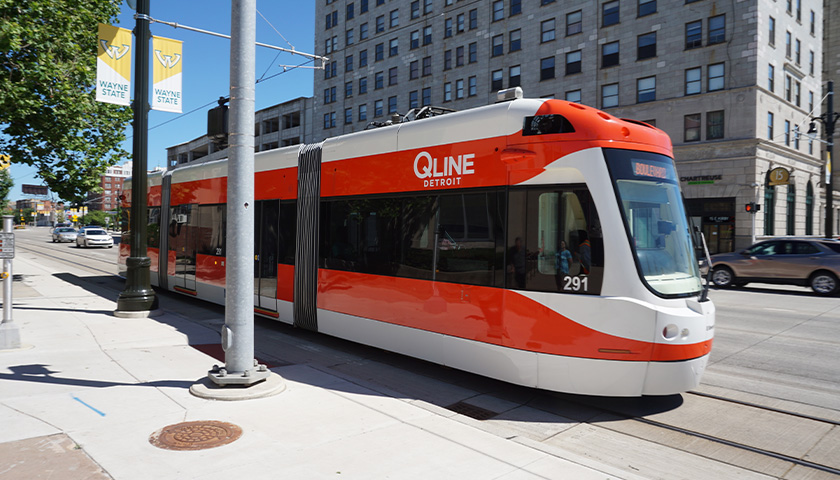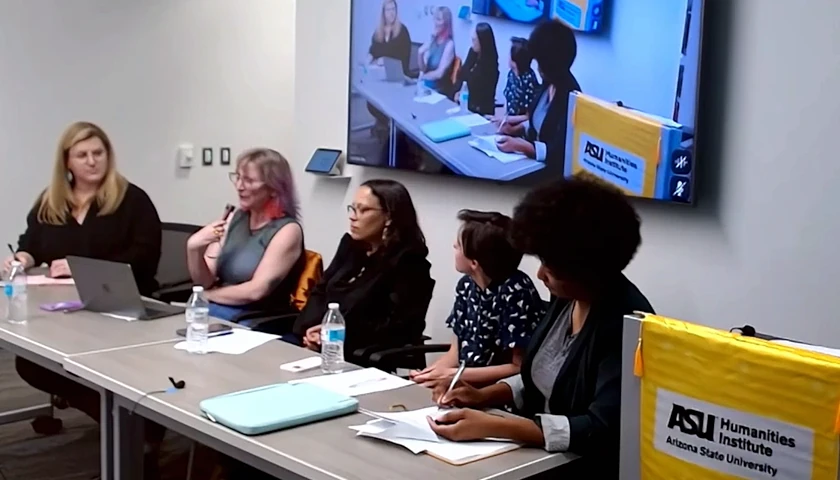by Bruce Walker
Prominent free-market proponents in Michigan are speaking out against the $85 million appropriation approved Thursday to fund Detroit’s QLine trolley over the next 17 years.
Gov. Gretchen Whitmer has indicated she will sign the $5 million annual QLine subsidy passed by the Legislature during its last session of 2022 – before Democrats exercise their newly-elected majorities in both the Senate and House of Representatives. The free trolley service transports riders along 12 stops on Woodward Avenue from Motor City’s cultural center to downtown Detroit.
James Hohman, fiscal policy director at the Mackinac Center, noted QLine has a limited ridership.
“Transit projects ought to be judged by whether they get people where they want to go quicker, better and cheaper than alternatives,” Hohman told The Center Square. “I don’t see the QLine doing much to improve transportation.”
According to the Detroit News, daily ridership over the last three months was 2,463, and the annual upkeep for the trolley is nearly $10 million, half of which is underwritten by the Kresge Foundation, Penske Corp., and Rocket Mortgage. The mortgage company purchased the naming rights when it was still called Quicken Loans.
Chris Douglas, assistant economics professor at the University of Michigan-Flint, told The Center Square that the QLine had to meet certain ridership projections for it to cover its costs.
“Actual ridership is much less than what was projected, hence the subsidies are needed to keep the QLine running,” Douglas said. “This is just another example of rosy projections used to justify some new project and then once the project is built, reality doesn’t meet the projections.”
Douglas compared the QLine to the People Mover, which has also failed consistently to meet ridership projections. He also referenced another potential public transit project under consideration in the state, the A2TC passenger train that would use existing rail to transport passengers between Ann Arbor and Traverse City.
“If a passenger train ends up being run between Ann Arbor and Traverse City, ridership on that will likely be much less than what was projected,” Douglas said.
The Center Square reported in August that State Sen. Wayne Schmidt, R-Traverse City, had secured $1 million of taxpayer dollars as chairman of the Senate Appropriations Committee for a Phase II study of the project. U.S. Transportation Secretary Pete Buttigieg, who previously announced he’s moving his family’s permanent residence from Indiana to Traverse City, granted an additional $1.3 million of federal taxpayer dollars for the same study.
“The heavily subsidized Little Caesar’s Arena has yet to generate the development in the surrounding area that was projected,” Douglas continued. “When people see a publicly subsidized project proposed, they should view its projected usage and benefits with a grain of salt.”
John Mozena, president of the Center for Economic Accountability, concurred with Hohman and Douglas in an email to The Center Square.
“The QLine subsidy is a great example of how cities screw up by putting lots of money into big, flashy projects in the name of ‘economic development’ instead of getting the basic, nuts-and-bolts stuff correct,” Mozena wrote.
“For instance, Detroit has the highest effective property tax rate on commercial buildings and homes in the nation. That means property owners must pay a larger percentage of their property’s value in taxes in Detroit than they would anywhere else. Things like that are what holds back investment and growth in Detroit, and there’s just no way that something like a streetcar moving at jogging speed down Woodward is going to overcome that kind of fundamentally bad public policy.”
Mozena asserted the convenience provided by QLine to Detroit visitors and residents doesn’t justify the costs to taxpayers throughout the state.
“Public transit doesn’t spur economic development when your city’s tax and regulatory policies encourage the public to live and work someplace else. Detroit saw that with the People Mover and it’s seeing it again with the QLine.”
Mozena also is skeptical whether the QLine’s current budget is sustainable over the course of the next 17 years.
“In the long run, there’s also the issue that at the end of this 17 years, it’s not like the burden on state taxpayers is going away,” he wrote. “That’s around when the QLine will be hitting the design lifespan of a streetcar system, and is going to need extremely expensive maintenance and upgrades to stay operational.”
– – –
Bruce Walker is a regional editor at The Center Square. He previously worked as editor at the Mackinac Center for Public Policy’s MichiganScience magazine and The Heartland Institute’s InfoTech & Telecom News.
Photo “Detroit’s QLine Trolley” by Michael Barera. CC BY-SA 4.0.





